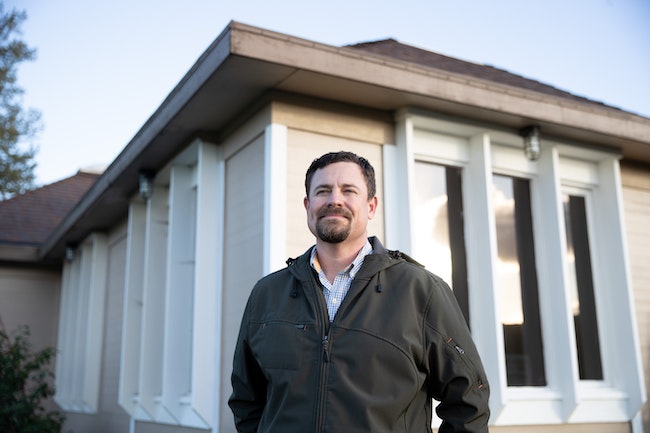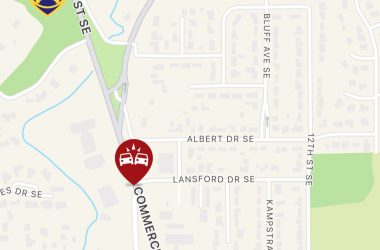
DJ Vincent stands outside of the Church @ The Park facility on Turner Road on Nov. 5, 2021. (Amanda Loman/Salem Reporter)
For DJ Vincent, homelessness wasn’t an area he chose to focus on.
“It just kind of grew in my heart over time,” he said.
The homeless social service provider he leads, Church at the Park, had humble beginnings. A group of volunteers would hand out meals near Cascades Gateway Park starting in 2007.
“We started saying, you know, can we go out with a table with a meal build the relationships that would help us encourage people to a better life and to their next steps,” he explained.
He called it a “table of love and acceptance for those who need it most.”
Vincent said at a peak, there would be about 30 people waiting for a meal.
He thought if the church consistently showed up, they would be able to help people.
For more than decade Church at the Park’s vision was simple. It was to provide meals and clothing and build relationships with the people they were handing a plate to.
“It was very humble, volunteer effort,” Vincent said.
Now, the organization has become one of Salem’s largest homeless service providers and a key part of the city’s plan to tackle a growing homeless crisis.
Church at the Park runs Salem’s only micro shelter villages, clusters of small buildings with space for about two people. The shelters are intended to serve as a stepping stone for people living out of a tent or in a car before they move into permanent housing.
The nonprofit serves about 200 meals a day and has a staff of more than 72 people.
The city awarded the nonprofit $1.1 million in federal Covid relief funds for costs related to providing shelter and safe parking at a micro shelter site on Catholic Community Services property located at 3737 Portland Rd. N.E. until June 30, 2022.
The funding covers staff, staff training, contracted services such as security, portable restrooms, food, insurance and utilities, according to an agreement signed by Vincent and City Manager Steve Powers on July 1.
The city also awarded Church at the Park a $240,000 grant to pay for 120 to 170 to-go meals per day, manage 20 vehicle camping sites for about 320 people, provide 80 tents and sleeping bags and other services like security, trash and bathrooms from July 1, 2021, to June 30, 2022.
 Roy Rincon, shelter manager with Church of the Park, works on constructing pallet shelters on Tuesday, April 13, 2021. (Amanda Loman/Salem Reporter)
Roy Rincon, shelter manager with Church of the Park, works on constructing pallet shelters on Tuesday, April 13, 2021. (Amanda Loman/Salem Reporter)
Fourteen years ago, Vincent and his wife Gabi were running an after-school program at Leslie Middle School under the name Emmaus.
Salem Leadership Foundation helped that small church expand.
Sam Skillern, executive director of the foundation, took Vincent and his wife on a tour around the city. He said, “Cascades Gateway (Park) caught their attention and won their hearts.”
They started out serving meals using a building at 2410 Turner Rd S.E. which Church at the Park now owns.
Vincent said of the original 30 people who would show up for meals, 14 went into housing. Twelve have died, with the church holding their funeral services. There are a few people who are living still living in Cascades Gateway Park, he said.
“Man, oh man has it grown beyond food and blankets,” Skillern said.
Last year, Vincent said there were several weeks in a row where he sat with women who had experienced abuse and sexual violence. Salem has more women on the streets than men.
“(I) just felt like, this is not good enough. We have to figure out how to shelter people,” he said.
That was the impetus for opening a women’s warming shelter on State Street last winter.
Things have grown from there.
In February, Church at the Park opened a temporary shelter at the Oregon State Fairgrounds Pavilion. The Mid-Willamette Valley Community Action Agency spent $250,000 on the camp and the city footed the bulk of the expense at $352,000.
 Elizabeth Freske stands outside her tent on Feb. 1 at the Oregon State Fairgrounds Pavilion. (Saphara Harrell/Salem Reporter)
Elizabeth Freske stands outside her tent on Feb. 1 at the Oregon State Fairgrounds Pavilion. (Saphara Harrell/Salem Reporter)
Vincent said that project opened the nonprofit’s eyes to the idea that once a person has their own space, their stuff is secure and they can rest, they become a totally different version of themselves.
“In a lot of ways, we were just testing theories. Like, oh if we put this square on the floor will people respect that and keep their stuff inside of that. Can we handle having 50 campsites in one place and will people be good neighbors to each other?” he said.
He said it exceeded their expectations.
The indoor space which had rows of tents was able to shelter 120 people.
“When we saw the change in their faces and bodies, when we saw the impact we could have, that brought us to the place of commitment. Yes, we’ve been doing meals and clothes and relationships for ten years, but there is truth behind the housing- first, sheltering-first in terms of restoring people’s humanity and their dignity,” he said.
He said half of the people hired to work at the women’s shelter on State Street and at the Pavilion were homeless themselves.
Vincent said they should be the ones benefiting from those jobs and have a huge amount of empathy because they understand the experiences of those they’re serving.
 Church at the Park ran a managed camp at the Oregon State Fairgrounds starting Feb. 1, 2021. (Saphara Harrell/Salem Reporter)
Church at the Park ran a managed camp at the Oregon State Fairgrounds starting Feb. 1, 2021. (Saphara Harrell/Salem Reporter)
When the Pavilion closed in April, Vincent said six households secured permanent housing and another 10 transitioned to more stable shelter. Vincent said 40 households got connected to resources like the Oregon Health Plan, nutritional assistance and other needs.
And he said self-reported alcohol and drug use went down and people went into detox programs.
“People are engaged in higher levels of cognitive thinking when they’re not constantly hyper vigilant about things being stolen or having a safe place to sleep at night. What’s my life supposed to be about? What kinds of jobs would I be good at?” he explained.
After the pavilion project ended, he said Church at the Park thought it would move to running a managed homeless camp.
But they couldn’t find an insurance company that would cover them to do that work.
So, they pivoted to micro shelters. Vincent said Portland and Eugene were putting up small shelter sites and they toured those facilities to learn best practices.
Now, Church at the Park runs two such sites, both on Northeast Portland Road.
A grant agreement between the city and Church at the Park budgeted the monthly cost at the micro shelter site at 2640 Portland Rd. at $88,215 per month. That cost includes staff, utilities, meals and training, among others.
The nonprofit is looking for other areas of the city to place micro shelters but has run into difficulty finding places that are suitable. The most recent effort to site shelters on Wallace Road faltered because the area is in a wetland.
Vincent said building relationships are key to addressing homelessness.
He said it’s important to view people experiencing homelessness as someone he would meet at his son or daughter’s school.
“Someone who has hit a hard time that I want to help. If that person is not a friend to me, then I don’t treat them with the respect they deserve,” he said.
“When you’ve actually come to that place of homelessness, you’ve probably had a lot of broken relationships. So, the way forward is building new relationships sometimes and having people who are strong and forgiving and patient in building those friendships with you,” he said.
Skillern said since 2004 Salem Leadership Foundation has had a program where it helps churches their capacity to serve neighborhoods.
Salem Free Clinics, the Northwest Hub and Salem for Refugees are programs that were born out of the process, he said. So was Church at the Park, a coalition of small churches including what once was Emmaus.
Though they helped Church at the Park get its start, the foundation and homeless service provider are separate nonprofits.
Skillern said if you look at history, theology and science, relationships either lead toward health or illness.
“Solutions have to be relationship based,” he explained.
He said that’s how Vincent and the church approach their work.
“They live it. It’s not just their job, it’s not just something they do,” Skillern said.
Contact reporter Saphara Harrell at 503-549-6250, [email protected].
JUST THE FACTS, FOR SALEM – We report on your community with care and depth, fairness and accuracy. Get local news that matters to you. Subscribe to Salem Reporter starting at $5 a month. Click I want to subscribe!









